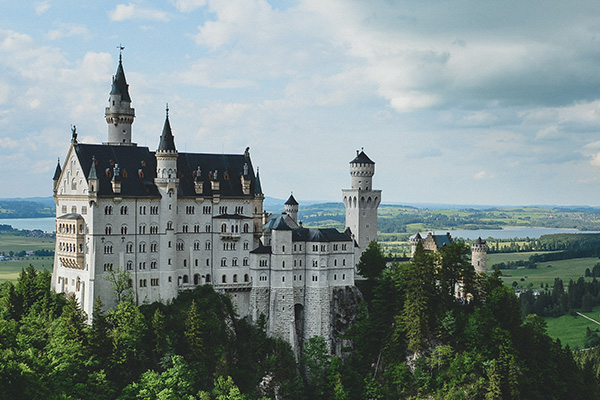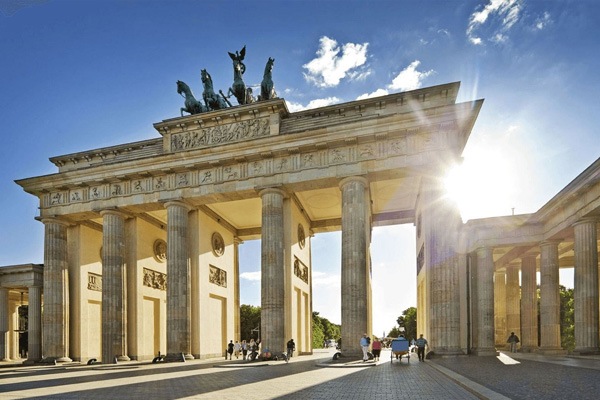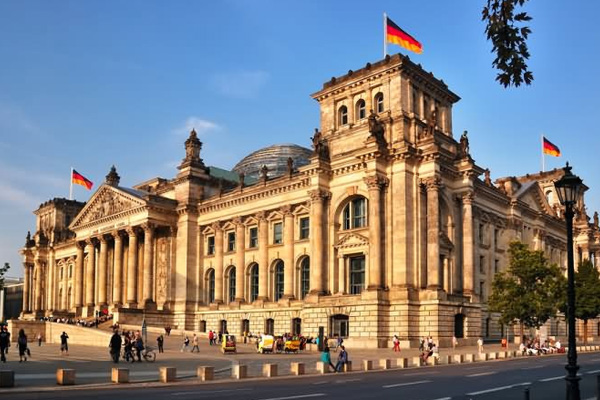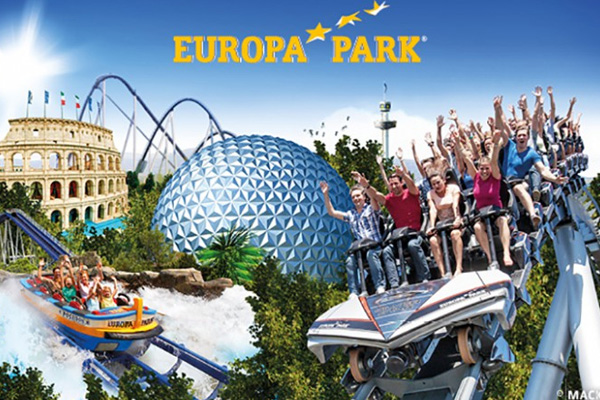Moving ToGermany
Points of Interest

NEUSCHWANSTEIN CASTLE

BRANDENBURG GATE

REICHSTAG BUILDING

EUROPA PARK
HISTORY
Germany was the dominant power on the continent. By 1900, its rapidly expanding industrial economy passed Britain’s, allowing a naval race and an aggressive foreign policy. Germany led the Central Powers in World War I (1914–1918) against France, Great Britain, Russia and (by 1917) the United States. Defeated and partly occupied, Germany was forced to pay war reparations by the Treaty of Versailles and was stripped of its colonies as well as Polish areas and Alsace-Lorraine. The German Revolution of 1918–19 deposed the emperor and the various kings and princes, leading to the establishment of the Weimar Republic, an unstable parliamentary democracy.
In the early 1930s, the worldwide Great Depression hit Germany hard, as unemployment soared and people lost confidence in the government. In 1933, the Nazi party under Adolf Hitler came to power and quickly established a totalitarian regime. Political opponents were killed or imprisoned. Nazi Germany’s foreign policy aimed to create a Greater Germany which consequently saw the remilitarization of the Rhineland in 1936, the annexing of Austria in the Anschluss and parts of Czechoslovakia with the Munich Agreement in 1938 (although in 1939 Hitler annexed further territory of Czechoslovakia), and its invasion of Poland on 1 September 1939 which initiated the Second World War.
ECONOMY
In 2016, Germany recorded the highest trade surplus in the world worth $310 billion, making it the biggest capital exporter globally. Germany is the third largest exporter in the world with 1.21 trillion euros ($1.27 trillion) in goods and services exported in 2016. The service sector contributes around 70% of the total GDP, industry 29.1%, and agriculture 0.9%. Exports account for 41% of national output. The top 10 exports of Germany are vehicles (, machinery, chemical goods, electronic products, electrical equipment, pharmaceuticals, transport equipment, basic metals, food products, and rubber and plastics
Government & Politics
Germany is a federal, parliamentary, representative democratic republic. The German political system operates under a framework laid out in the 1949 constitutional document known as the Grundgesetz (Basic Law). Amendments generally require a two-thirds majority of both chambers of parliament; the fundamental principles of the constitution, as expressed in the articles guaranteeing human dignity, the separation of powers, the federal structure, and the rule of law are valid in perpetuity. The president, Frank-Walter Steinmeier (19 March 2017–present), is the head of state and invested primarily with representative responsibilities and powers. The chancellor, Angela Merkel (22 November 2005–present), is the head of government and exercises executive power, similar to the role of a Prime Minister in other parliamentary democracies.
Geography
Germany is a country in west-central Europe, that stretches from the Alps, across the North European Plain to the North Sea and the Baltic Sea. Germany has the second largest population in Europe (after the European part of Russia) and is seventh largest in area. Germany shares borders with nine European countries, second only to Russia: Denmark in the north, Poland and the Czech Republic in the east, Switzerland (its only non-EU neighbor) and Austria in the south, France in the southwest and Belgium, Luxembourg and the Netherlands in the west.
Start your journey today!
Culture

Arts
VISUAL ARTS
German painters have influenced western art. Albrecht Dürer, Hans Holbein the Younger, Matthias Grünewald and Lucas Cranach the Elder were important German artists of the Renaissance, Peter Paul Rubens and Johann Baptist Zimmermann of the Baroque, Caspar David Friedrich and Carl Spitzweg of Romanticism, Max Liebermann of Impressionism and Max Ernst of Surrealism. Such German sculptors as Otto Schmidt-Hofer, Franz Iffland, and Julius Schmidt-Felling made important contributions to German art history in the late 19th and early 20th centuries.
LITERATURE AND PHILOSOPHY
German literature can be traced back to the Middle Ages and the works of writers such as Walther von der Vogelweide and Wolfram von Eschenbach. Well-known German authors include Johann Wolfgang von Goethe, Friedrich Schiller, Gotthold Ephraim Lessing and Theodor Fontane. The collections of folk tales published by the Brothers Grimm popularised German folklore on an international level.
German philosophy is historically significant: Gottfried Leibniz’s contributions to rationalism; the enlightenment philosophy by Immanuel Kant; the establishment of classical German idealism by Johann Gottlieb Fichte, Georg Wilhelm Friedrich Hegel and Friedrich Wilhelm Joseph Schelling; Arthur Schopenhauer’s composition of metaphysical pessimism; the formulation of communist theory by Karl Marx and Friedrich Engels; Friedrich Nietzsche’s development of perspectivism; Gottlob Frege’s contributions to the dawn of analytic philosophy; Martin Heidegger’s works on Being; Oswald Spengler’s historical philosophy; the development of the Frankfurt School by Max Horkheimer, Theodor Adorno, Herbert Marcuse and Jürgen Habermas have been particularly influential.
FILM
German cinema made major technical and artistic contributions to film during the period from 1918–1933.
Among the box office hits, there were films such as Chariots of the Gods (1970), Das Boot (The Boat, 1981), The Never Ending Story (1984), Otto – The Movie (1985), Run Lola Run (1998), Manitou’s Shoe (2001), the Resident Evil series (2002–2016), Good Bye, Lenin! (2003), Head On (2004), The White Ribbon (2009), Animals United (2010), and Cloud Atlas (2012). The Academy Award for Best Foreign Language Film (“Oscar”) went to the German production Die Blechtrommel (The Tin Drum) in 1979, to Nirgendwo in Afrika (Nowhere in Africa) in 2002, and to Das Leben der Anderen (The Lives of Others) in 2007. Various Germans won an “Oscar” award for their performances in other films.
MUSIC
Germany claims some of the renowned composers, producers and performers of the world. Germany is the largest music market in Europe, and third largest in the world. German Classical is one of the most performed in the world; German composers include some of the most accomplished and popular in history, among them Johann Sebastian Bach, Ludwig van Beethoven, Felix Mendelssohn, Johannes Brahms, Robert Schumann and Richard Wagner. Wolfgang Amadeus Mozart (also recognized as Austrian) was among the composers who created the field of German opera. One of the most famous film score composers is Hans Zimmer.

Media
The largest internationally operating media companies in Germany are the Bertelsmann enterprise, Axel Springer SE and ProSiebenSat.1 Media. The German Press Agency DPA is also significant. Germany’s television market is the largest in Europe, with some 38 million TV households. Around 90% of German households have cable or satellite TV, with a variety of free-to-view public and commercial channels. There are more than 500 public and private radio stations in Germany, with the public Deutsche Welle being the main German radio and television broadcaster in foreign languages. Germany’s national radio network is the Deutschlandradio while ARD stations are covering local services.

Cuisine
Bread is a significant part of German cuisine and German bakeries produce about 600 main types of bread and 1,200 different types of pastries and rolls (Brötchen). German cheeses account for about a third of all cheese produced in Europe. In 2012 over 99% of all meat produced in Germany was either pork, chicken or beef. Germans produce their ubiquitous sausages in almost 1,500 varieties, including Bratwursts, Weisswursts, and Currywursts.
Although wine is becoming more popular in many parts of Germany, especially close to German wine regions, the national alcoholic drink is beer. German beer consumption per person stands at 110 litres (24 imp gal; 29 US gal) in 2013 and remains among the highest in the world. German beer purity regulations date back to the 15th century.

Sports & Recreations
Twenty-seven million Germans are members of a sports club and an additional twelve million pursue sports individually. Association football is the most popular sport. With more than 6.3 million official members, the German Football Association (Deutscher Fußball-Bund) is the largest sports organisation of its kind worldwide, and the German top league, the Bundesliga, attracts the second highest average attendance of all professional sports leagues in the world. The German men’s national football team won the FIFA World Cup in 1954, 1974, 1990, and 2014, the UEFA European Championship in 1972, 1980 and 1996, and the FIFA Confederations Cup in 2017. Germany hosted the FIFA World Cup in 1974 and 2006 and the UEFA European Championship in 1988.
Other popular spectator sports include winter sports, boxing, basketball, handball, volleyball, ice hockey, tennis, horse riding and golf. Water sports like sailing, rowing, and swimming are popular in Germany as well. Germany is one of the leading motorsports countries in the world. Constructors like BMW and Mercedes are prominent manufacturers in motorsport.








